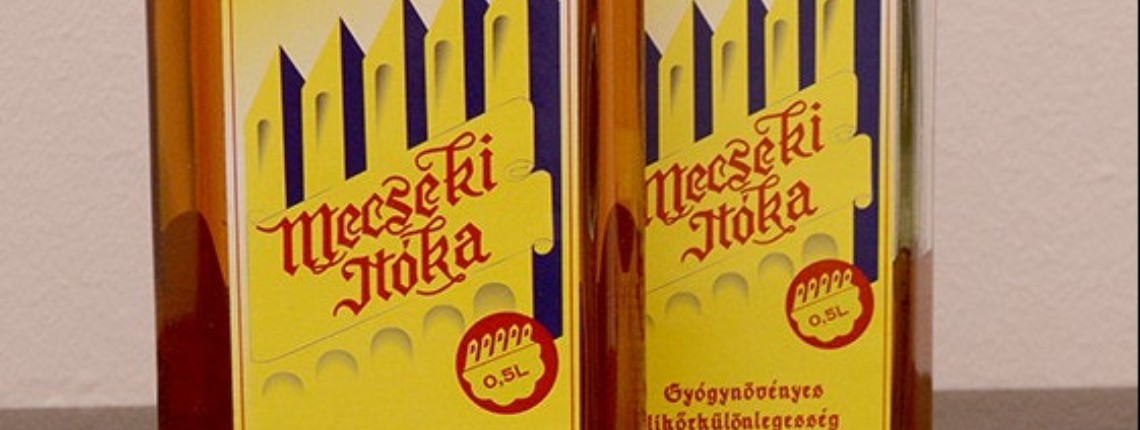Mecseki Itóka is an herbal liqueur containing more sugar than other bitters, so its sweet and mildly bitter flavour can appeal to many people. Mecseki Itóka is a bright greenish-brown herbal liqueur with a characteristic aroma and a mildly bitter and spicy savour. It contains 38 V/V% alcohol and 30 g/100 cm3 sugar. It contains about15 different potherbs, green walnut extract, rectified spirit, sugar, demineralised water, and caramel.
Many herbal ingredients including gentian-root, camomile, gingerroot (also known as Wood-Avens, St. Benedict’s herb, or Geum urbanum L.), juniper-berry, and some of the potherbs naturally grow or are grown and gathered in the vicinity of Mecsek Mountains. The name, Mecseki Itóka, therefore, refers to the origin of its main ingredients.

After much experimentation with the drink ingredients, Mecseki Itóka was crafted by pharmacist Kálmán Geiger who was born in 1902. With a degree in pharmacy, he started to work in Wéber apothecary’s shop in 1925. He loved his job but after a while he realised that he wanted to achieve more than the mundane duties of his job. Wanting to make his mark in the world, he started experimenting with a special medicinal liqueur. Meanwhile, he got married and the dowry he received allowed him to enter into a business partnership with Wéber apothecary’s shop in which he had been employed before. After almost three-years of experimentation, Mecseki Gyógyitóka (Mecsek Medicinal Liqueur)– primarily a medicinal liqueur for treating stomach complaints – was finally displayed in the shopwindow of Wéber apothecary’s shop. The name Mecseki Gyógyitóka was short-lived. A legal action put an end to heated debates, and the liqueur was renamed to Mecseki Itóka (Mecsek Livener) in 1936.
The recipe came into the possession of Zwack Unicum Public Limited Company shortly before World War II. After the war, private companies including spirits companies became state owned. The industrial management at the time did not care about the local traditions of Hungarian products, so Mecseki Itóka was no longer made in Pécs but in a factory in Budapest. In the new factory, the drink was crafted based on the recipe owned by Zwack Company. The ingredients of the liqueur remained unchanged, only the place of production changed. Today, Mecseki Itóka is one of the several Zwack Unicum products.
Mecseki Itóka is a medicinal liqueur, recommended after meals or with desserts, or as a social drink. It is also an excellent cocktail base.
The production technology follows the established production technology associated with herbal liqueurs. The herbs are selected as specified in the recipe. The extract made from green walnut is made separately from the other herbs which are cold pressed together, using a process called static pressure. First, spirit is poured on the herbal bed to let it soak for a while. The tincture is periodically stirred before it is decanted. Then, the aromatic alcoholic tincture remaining on the herbal bed is filtered.
Before making the drink (the ingredients are used in a controlled fashion based on the recipe), the herbal extract is put through a so-called stabilisation treatment. The extract contains proteins in colloidal state (i.e. in large molecules) that can form deposits in the final product that are hard to remove or filter out. To prevent this, the alcohol content of the extract is enhanced to 80-85V/V% by adding rectified spirit. Due to the high alcohol content, the proteins precipitate (drop out), settle, and thus they can be easily removed by filtering.
The drink made based on the recipe (caramel is added only to achieve the desired colour) is aged for 1-2 months before it is filtered and bottled (0.2, 0.5 l).
The label on the product visually represents the origin of the product symbolising Pécs.
1000 hl of Mecseki Itóka is produced every year.
The registered brand and all rights related to the product are held and owned by the manufacturer, Zwack Unicum Company. The drink has been a protected trademark since 1968. The popular drink is sold nationwide in retail and wholesale shops, as well as in restaurants, hotels, and night clubs.

